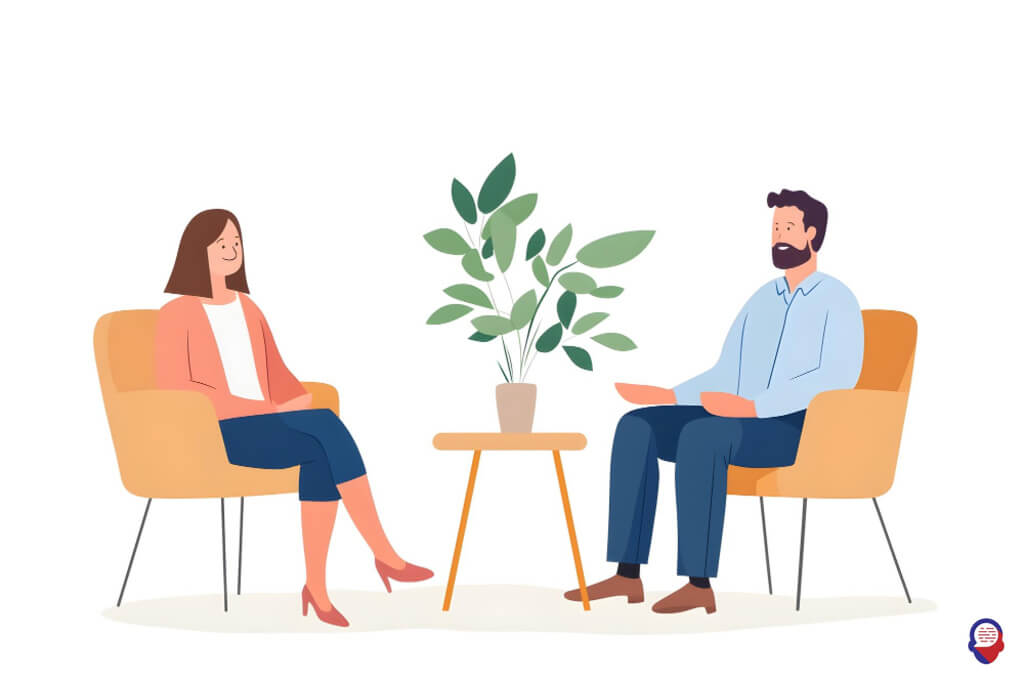Healing Through Connection: A Guide to Relational Therapy
Have you ever felt that the key to your struggles lies not just within you, but in the intricate web of your relationships? We are born into connection, shaped by it, and sometimes, wounded by it. Relational Psychodynamic Therapy is a profound journey that places this fundamental truth at its very core. It moves beyond simply analyzing the past, instead inviting you into a living, breathing therapeutic relationship where old patterns can be understood and new, healthier ways of connecting can be born.
This is not a therapy of cold observation or a one-size-fits-all manual. It is a deeply human, collaborative process. It acknowledges that healing doesn’t happen in a vacuum, it happens in the presence of another person who is authentic, engaged, and committed to understanding your unique world. Together, you and your therapist explore the subtle, often unconscious, ways your earliest bonds have shaped how you see yourself, others, and the world today. This is a path toward not just symptom relief, but lasting, meaningful change in how you experience your life and your relationships.

What Is Relational Psychodynamic Therapy?
Relational Psychodynamic Therapy is a form of depth therapy that focuses on the central role that relationships, both past and present, play in shaping our personality and psychological well-being. It proposes that our inner world is built from the templates of our earliest connections with caregivers and that our current difficulties often stem from replaying these old, ingrained patterns in our present-day relationships.
This approach is a significant evolution from classical psychoanalysis. While it shares a foundation in psychodynamic principles, like the importance of the unconscious, it diverges dramatically in its view of the therapist’s role. Instead of a detached, "blank slate" analyst, the relational therapist is seen as an active, engaged participant in the therapeutic process. The therapy itself becomes a new relational experience, a laboratory where you can safely explore and rework the ways you connect with others.

How does it differ from traditional psychoanalysis?
The primary difference lies in the concept of a "two-person psychology." Traditional psychoanalysis operates on a "one-person" model, where the therapist is an objective expert interpreting the client’s internal world. Relational therapy, conversely, is built on a "two-person" model, asserting that both the client and the therapist mutually influence each other. The focus is on what happens between them, not just what is happening inside the client.
In this view, the therapist’s own feelings, reactions, and subjectivity are not seen as interruptions but as valuable sources of information about the client’s relational patterns. The relationship is not just the setting for the work, it is the work. This creates a more collaborative, authentic, and often more dynamic therapeutic experience. It acknowledges the simple reality that you cannot understand relationships from the outside, you have to be in one.

What is the main goal of this therapy?
The ultimate goal is to help you develop a richer, more flexible, and more authentic way of being in relationships with others and with yourself. It aims to increase your capacity for intimacy, connection, and self-acceptance by bringing unconscious relational patterns into conscious awareness. By understanding how and why you relate to people in the ways you do, you gain the freedom to choose differently.
This isn’t just about fixing a problem, it’s about expanding your entire relational world. The therapy seeks to repair the developmental disruptions caused by early, non-ideal relationships. Through the safe, consistent, and attuned connection with the therapist, you can internalize a new, healthier model for relationships, one that you can then carry into your life outside the therapy room.

Why Is the Therapeutic Relationship So Important?
The therapeutic relationship is considered the primary agent of change in this approach. It is the living, breathing crucible in which transformation occurs. This is because relational therapy believes our deepest wounds are relational in nature, and therefore, they can only be healed within the context of a new, different kind of relationship.
Think of it this way, you can’t learn to swim by reading a book about it. You have to get in the water. Similarly, you can’t heal relational trauma or change ingrained relational patterns simply by talking about them in the abstract. You have to experience them and work through them in a live, interactive relationship with a trusted other.

What does it mean that the relationship is “co-created”?
Co-creation means that the therapeutic experience is jointly built by both the client and the therapist. Your unique personality, history, and relational style interact with the therapist’s unique personality, history, and relational style. Together, you create a one-of-a-kind dynamic that is specific to the two of you.
This concept moves away from the idea that the client simply "projects" their issues onto a neutral therapist. Instead, it recognizes that the therapist is also contributing to the dynamic. What emerges is a shared reality, a unique interpersonal field. Understanding this co-created dance is central to the therapeutic work, as it reveals the subtle ways you and others mutually influence each other in all your relationships.

What is an “enactment”?
An enactment is when an old, unconscious relational pattern from your past gets "played out" in the present moment with your therapist. It’s as if you and the therapist have unknowingly been cast in a play, and you are both acting out a familiar script from your life, a script about power, neglect, validation, or abandonment. You might, for example, begin to feel that your therapist is disappointed in you, replaying a dynamic you often felt with a parent.
Crucially, enactments are not seen as mistakes or failures in the therapy. They are viewed as profound opportunities. When an enactment happens, it brings the core, unspoken problem directly into the room. It moves the issue from a story you tell to an experience you are having right now. By noticing, stopping, and exploring the enactment together, you and your therapist can gain powerful insights into your deepest relational patterns and begin to write a new ending to the script.

How does the therapist use their own feelings?
In relational therapy, the therapist’s authentic emotional responses, known as countertransference, are considered vital data. If a therapist finds themselves feeling bored, frustrated, or unusually protective while with you, they don’t dismiss these feelings as their own "stuff." Instead, they ask, "What is happening in our relationship right now that is making me feel this way? What might this feeling tell me about my client’s inner world and how they impact others?"
This use of the therapist’s subjectivity is a powerful tool. It can provide clues to what you might be unconsciously communicating or what it feels like to be in a relationship with you. Of course, this is done with immense professional care and ethical consideration. The therapist’s feelings are used in service of your therapy, helping to illuminate relational dynamics that might otherwise remain hidden.

What Is the Role of the Past?
The past is profoundly important in relational therapy, but it is viewed through a specific lens. The focus is not just on cataloging historical events, but on understanding how those past experiences, particularly early relationships, have organized your inner world and continue to live on in the present.
The past isn’t something that is "over there." It is alive within you, shaping your expectations, your fears, your desires, and your automatic ways of relating to others. The therapy helps you see the threads connecting your past relationships to your present-day struggles, making sense of why you feel and act the way you do.

How does the past influence present relationships?
Your earliest relationships with caregivers form a set of implicit, unconscious "rules" about how relationships work. These rules create a template. You learn what to expect from others, how to get your needs met, which emotions are acceptable, and how to maintain a connection. This template becomes the blueprint for all future relationships.
If your early environment was nurturing and responsive, you likely developed a template that says, "I am worthy of love, and others can be trusted." If, however, your early environment was inconsistent, critical, or neglectful, your template might be, "I must be perfect to be loved," or "Intimacy is dangerous," or "My needs don’t matter." Relational therapy helps you uncover and revise these foundational, often self-limiting, blueprints.

Is this therapy just about blaming my parents?
Absolutely not. While the therapy does explore the impact of early caregiving, the goal is understanding, not blame. It acknowledges that parents are complex human beings who were also shaped by their own histories and limitations. The aim is to develop compassion for yourself by understanding the origins of your struggles.
It’s about recognizing how you adapted to your early environment and how those adaptations, which were once necessary for survival, may now be holding you back. By depersonalizing these patterns, you can stop blaming yourself for them and begin the work of changing them. The focus is on your subjective experience of your past, not on creating an objective "case" against anyone.

What Does a Typical Session Look Like?
A typical session looks, on the surface, like a conversation, but it is a conversation with a very particular focus and depth. You are encouraged to speak freely about whatever is on your mind, whether it’s a problem at work, a dream you had, a memory, or a feeling you are having about the therapy itself.
The therapist listens not just to the content of what you are saying, but also to the music beneath the words. They pay close attention to the emotional tone, the patterns in your stories, and what is happening in the relational dynamic between the two of you in that very moment. The process feels fluid and natural, yet it is guided by the therapist’s trained attention to these deeper currents.

What will I talk about?
You can talk about anything. There is no set agenda. The process trusts that your most pressing concerns and core themes will naturally emerge. You might start by discussing a current stressor, which could lead to a memory from childhood, which might then connect to a feeling you are having towards the therapist.
The therapist will help you explore these connections. They might ask questions that encourage deeper reflection, such as "I wonder if that feeling of being overlooked at your job feels familiar to you?" or "As you tell me this, I notice a shift in your tone. What’s happening for you right now?" The conversation weaves between past and present, between your life outside and your experience inside the therapy room.

How long does this type of therapy take?
Relational Psychodynamic Therapy is typically a long-term process. Because it aims for deep, structural change in personality and relational patterns, rather than just short-term symptom relief, it requires time and commitment. The duration can range from a year to several years, depending on your individual needs and goals.
The length is not arbitrary. It takes time to build the trust and safety necessary for deep exploration. It takes time for unconscious patterns to emerge and be understood within the therapeutic relationship. The goal is lasting change, and like any profound learning process, it cannot be rushed. The investment in time reflects the depth of the transformation that is possible.

Who Can Benefit From This Approach?
This approach can be beneficial for a wide range of individuals, particularly those who feel their difficulties are rooted in long-standing patterns of relating to themselves and others. It is not a quick fix but is for those seeking a deeper understanding of who they are.
People struggling with chronic depression, anxiety, low self-esteem, or a vague sense of emptiness or meaninglessness often find this therapy incredibly helpful. It is especially powerful for those who repeatedly find themselves in unsatisfying or destructive relationships, whether romantic, professional, or familial. It helps answer the question, "Why does this keep happening to me?"

Can it help with specific mental health conditions?
Yes, it can be very effective for a variety of conditions. For anxiety, it looks beyond the surface symptoms to explore the underlying relational fears and insecurities that fuel the anxiety. For depression, it can help uncover the roots of hopelessness or self-criticism that are often tied to early experiences of loss, disappointment, or lack of validation.
For personality disorders, which are by definition disturbances in relational functioning, this therapy is often considered a primary treatment of choice. It provides a corrective relational experience where the rigid patterns associated with these conditions can be gradually understood and softened. The focus on the therapeutic relationship itself makes it uniquely suited to address these deeply ingrained ways of being.

Is this therapy right for me?
This therapy may be right for you if you are curious about yourself and willing to engage in a process of open-ended exploration. It is a good fit if you suspect your current problems are connected to your past and you are looking for more than just coping skills. You need to be prepared for a process that can sometimes be challenging and emotionally intense, but also deeply rewarding.
The most important factor is the "fit" between you and the therapist. Because the relationship is so central, it is vital that you feel a sense of safety, trust, and connection with the person you choose to work with. A good relational therapist will make you feel seen, heard, and respected, even when exploring difficult material.
Frequently Asked Questions

What if I don’t feel a connection with my therapist?
This is a very important question. A strong therapeutic alliance is the bedrock of this work, so if you don’t feel a good connection after the first few sessions, it is crucial to address it. Sometimes, this feeling itself can be therapeutically useful to explore. It might be part of a familiar pattern of struggling to connect or trust others.
However, you should feel a basic sense of safety, respect, and that the therapist is "getting" you. It is perfectly acceptable to meet with a few different therapists before settling on one. Trust your gut. A good therapist will understand and respect this process, encouraging you to find the right fit for your needs.

Is it normal to feel worse before I feel better?
Yes, this can be a normal part of the process for some people. As you begin to touch upon painful memories and difficult feelings that may have been buried for a long time, it is natural to feel a temporary increase in distress. This is often a sign that the therapy is beginning to reach the core issues.
Think of it like cleaning out a long-neglected wound, it can be painful before the healing begins. A skilled therapist will help you navigate this process at a pace that feels manageable. They will provide the support and containment you need to move through the discomfort towards greater insight and relief. It is important to communicate these feelings to your therapist so they can support you effectively.

How is confidentiality handled in relational therapy?
Confidentiality is a sacred and legally protected pillar of all forms of therapy, including relational work. Everything you say to your therapist is kept in the strictest confidence. This creates the safe container necessary for you to be open and vulnerable without fear of judgment or exposure.
The only exceptions to confidentiality are specific situations where there is a risk of harm to yourself or others, or in cases of child abuse, which therapists are legally mandated to report. Your therapist will explain these limits to you clearly at the beginning of your work together. The therapist’s use of their own feelings is for internal processing or, if shared, is done carefully and thoughtfully to help you, never as a casual disclosure about their own life.

Can I do this therapy online?
Yes, many relational therapists now offer sessions online. While in-person therapy has traditionally been the standard, technology has allowed for the creation of deep and effective therapeutic relationships remotely. The core principles of the therapy remain the same, focusing on the dynamic between you and the therapist.
For online therapy to be successful, it is important to ensure you have a private, quiet space for your sessions where you will not be interrupted. A stable internet connection is also key. For many people, online therapy offers a convenient and accessible way to engage in this profound work, removing geographical barriers to finding the right therapist for you.
Your journey to healing is built on connection. The patterns of the past do not have to dictate your future. At Counselling-uk, we believe in providing a safe, confidential, and professional place where you can build a transformative therapeutic relationship. Here, you can find the support to understand your story, heal old wounds, and navigate all of life’s challenges. Begin your path to a more authentic and connected life today.



